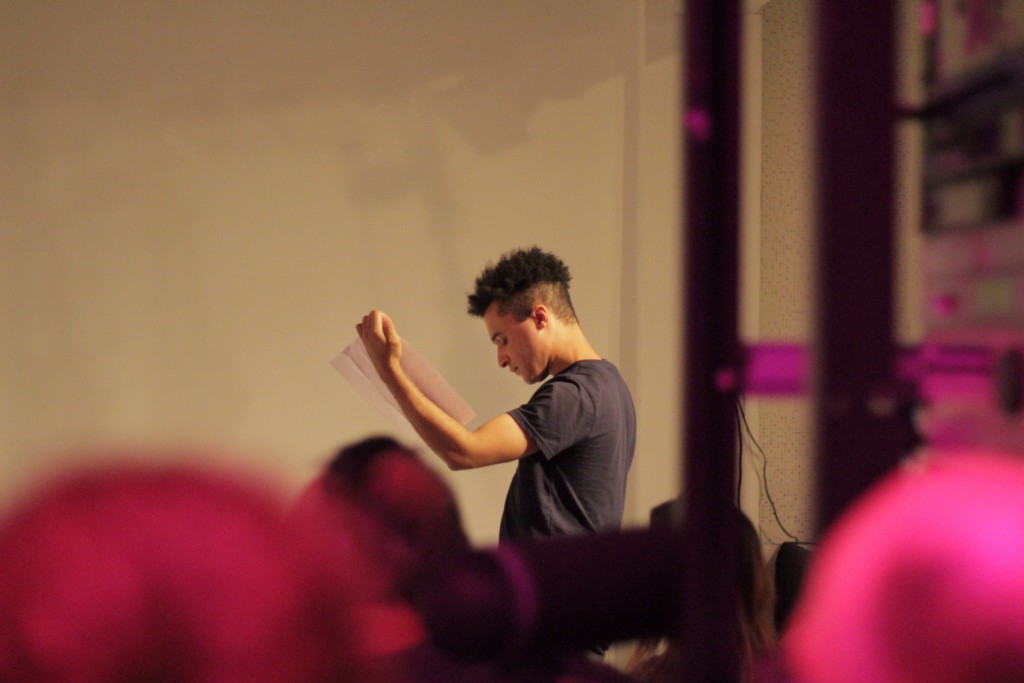Music, art, machines and more.
By Christian Drew, Music undergraduate student.
Somewhere near the end of an in-depth discussion around his work, David Pocknee is asked what the relationship might be between the various divergent paths his output as composer, performer, researcher and visual artist has taken. An answer to such a question is not clear cut, as Pocknee himself admits that the diversity of his practice evades any easy summary. From witty and ironic text scores, to politically fuelled manifestos, to complex multi-media installations, Pocknee’s eccentricities are underpinned by a defiant thoroughness, pushing every idea to its utmost limits.

Our meeting with Pocknee was at the last Postgraduate Listening Group of the year, organised by PhD composer Alex Glyde-Bates. I was fortunate to give a short talk on the little-known work of German composer Jakob Ullmann, after which our guest composer, currently completing a PhD at the University of Huddersfield, introduced us to a few of the wide-reaching corners of his own musical practice.
Not exactly a piece of music, the “choose your own adventure self-help book” titled Selfhelplessness is an apt example of one of the ways that Pocknee works: taking a concept and stretching it beyond what might reasonably be expected, here applying musically derived processes and techniques to the construction of a non-musical work. Naturally the book is entirely unhelpful, giving no real answers, leaving the reader in a wholly despondent state of amused bewilderment.
As the title suggests, the first piece Pocknee plays us, MG3250 Performs Cornelius Cardew’s “Treatise”, involves an inkjet printer printing the first 94 pages of the influential open-scored composition. Provoking and just a little bit facetious, this conceptual work raises questions concerning the nature of realisation, the role of sentience in interpretation and the controversial validity of a machine performing something made for humans.
Next we take a look at an almost conventional piece of piano music, A Beethoven Mesostic, which applies the principles of the mesostic poem to the methodical construction of a solo piano work. As used extensively in the poetry of John Cage, this form sees a vertically placed index term (much like an acrostic) intersected by horizontal phrases or fragments from a pre-existing text. Abstracting these notions, Pocknee designed a computer algorithm that selects fragments from each of Beethoven’s piano sonatas, slotting them around a rising internal chromatic line. The result is a simultaneously splintered but surprisingly cohesive collage of events; asymmetric Beethovian cells teetering on the edge between the familiar and the obtuse.
The importance of pushing the idea to its limits in Pocknee’s work is perhaps best illustrated in his involvement with the New Fordist Organisation. In summary, their manifesto outlines an intention to apply the principles of mass-production and mechanised creation pioneered by Henry Ford to the creation of performance and visual art. Some of the works produced through the New Fordist paradigm include a computerised programme that converts an improvisation on a MIDI controller into a fully orchestrated arrangement in under 20 minutes, an efficiency-saving system that uses lighting to show an untrained performer how to play the piano, and a similar approach applied to painting that uses a computer to analyse an image in order to show an untrained painter exactly where to apply their brush strokes in order to recreate the image. Sitting somewhere between political critique and droll irony, Pocknee’s work with the New Fordist Organisation is both conceptually stimulating and deceptively beautiful, not to mention prolific in its complexity and scale.
I was fortunate to spend a little time with our guest composer the following day, presenting and discussing a few of my own pieces. As I had hoped, Pocknee’s gentle approach and probing criticality gave me a valuable new perspective on some of the ways that I’ve been working over the last few months. The oblique way that Pocknee approaches his surroundings translated aptly to his role here as a mentor, providing us with a side-on look at our own practices, pointing us away from some of the compositional corners we had got ourselves into.
If all this wasn’t enough, on top of his own artistic output Pocknee co-curates the WEISSLICH concert series, bringing together experimental music and performance art from a range of disciplines in 3-4 annual concerts. I sincerely recommend keeping an eye out for their next event on the site linked below. But in the mean time, David Pocknee’s own website has a wealth of material to wrap your eyes, ears and heads around.


